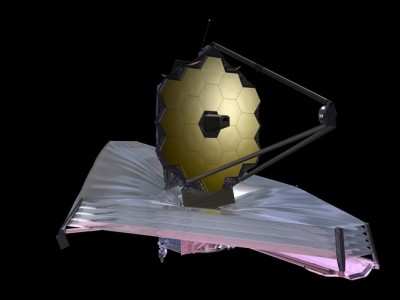Mon, Jun 18, 2012
MIRI Was Developed By A European Consortium And NASA's JPL
The first of four instruments to fly aboard NASA's James Webb Space Telescope (Webb) has been delivered to NASA. The Mid-Infrared Instrument (MIRI) will allow scientists to study cold and distant objects in greater detail than ever before. MIRI arrived at NASA's Goddard Space Flight Center in Greenbelt, MD, May 29. It has been undergoing inspection before being integrated into Webb's science instrument payload known as the Integrated Science Instrument Module (ISIM).

Assembled at and shipped from the Science and Technology Facilities Council's Rutherford Appleton Laboratory in the United Kingdom, MIRI was developed by a consortium of 10 European institutions and NASA's Jet Propulsion Laboratory (JPL) in Pasadena, CA, after having been handed over to the European Space Agency.
MIRI will observe light with wavelengths in the mid-infrared range of 5 microns to 28 microns, which is a longer wavelength than human eyes can detect. It is the only instrument of the four with this particular ability to observe the physical processes occurring in the cosmos.
"MIRI will enable Webb to distinguish the oldest galaxies from more evolved objects that have undergone several cycles of star birth and death," said Matt Greenhouse, ISIM project scientist at Goddard. "MIRI also will provide a unique window into the birth places of stars which are typically enshrouded by dust that shorter wavelength light cannot penetrate."
MIRI's sensitive detectors will allow it to observe light, cool stars in very distant galaxies; unveil newly forming stars within our Milky Way; find signatures of the formation of planets around stars other than our own; and take imagery and spectroscopy of planets, comets and the outermost bits of debris in our solar system. MIRI's images will enable scientists to study an object's shape and structure.
The most powerful space telescope ever built, Webb is the successor to NASA's Hubble Space Telescope. Webb's four instruments will reveal how the universe evolved from the Big Bang to the formation of our solar system. Webb is a joint project of NASA, the European Space Agency and the Canadian Space Agency. (Image provided by NASA)
More News
Its Offerings Are Lighter, Cleaner, and Now Pushing Past 1,000nm on SAF Jet Fuel DeltaHawk’s diesel-powered aircraft lineup has seen incredible upgrades over the last few yea>[...]
The Airplane Experienced A Total Loss Of Engine Power On December 3, 2025, about 1600 central standard time, a Mooney Aircraft Corp. M20K, N57229, was substantially damaged when it>[...]
Make Sure You NEVER Miss A New Story From Aero-News Network Do you ever feel like you never see posts from a certain person or page on Facebook or Instagram? Here’s how you c>[...]
Aero Linx: European Society of Aerospace Medicine (ESAM) As a pan-European, independent forum, it works to promote the safety and health of all persons involved in aviation and spa>[...]
“We are excited to see Wisk achieve this milestone, and I’m so proud of the team that made it possible. The team at Wisk has built advanced technologies across flight c>[...]
 Aero-TV: DeltaHawks Diesel Power Steps Into the Spotlight
Aero-TV: DeltaHawks Diesel Power Steps Into the Spotlight NTSB Prelim: Mooney Aircraft Corp. M20K
NTSB Prelim: Mooney Aircraft Corp. M20K ANN FAQ: Turn On Post Notifications
ANN FAQ: Turn On Post Notifications ANN's Daily Aero-Linx (12.20.25)
ANN's Daily Aero-Linx (12.20.25) Aero-News: Quote of the Day (12.20.25)
Aero-News: Quote of the Day (12.20.25)



